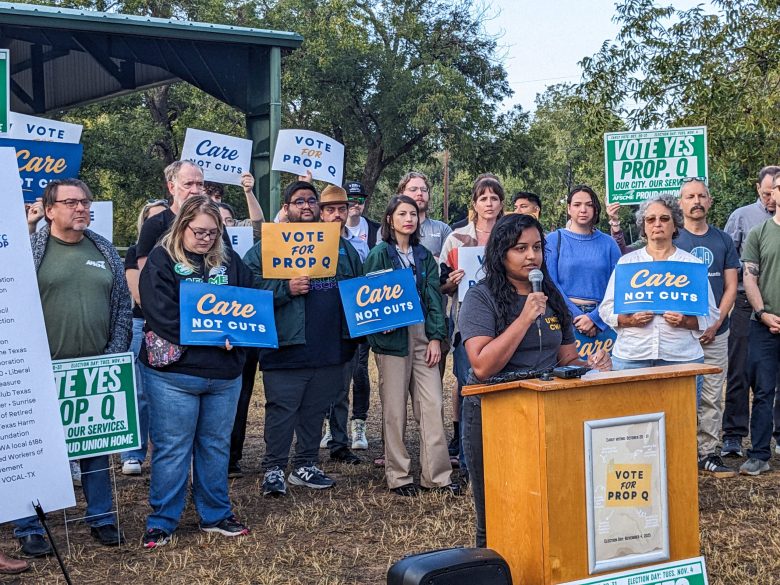Joan Saslow Duce was confused about how much Prop Q would cost. She’d heard different numbers from different sources.
The city of Austin’s estimate was that Prop Q – the proposal to increase property taxes at the Nov. 4 election – would cost the average property owner about $200 a year. Prop Q’s opponents said it would cost at least $482 a year. One group said it would cost much more – over $1,000 a year.
So Duce broke down the taxes for her Eastside home, valued at about $450,000, quite close to the $500,000 value used to make the other calculations. She took the number on her property tax bill under “net taxable value,” across from “City of Austin (Trav),” and multiplied that by 0.0005, the number Duce sourced from the city’s ballot proposition langugage. Then she spent a few frenzied days building a website to show what she found, including the formula she used to determine Prop Q’s cost.
Her takeaway, she told the Chronicle, is that the city’s numbers seem about right. And people who are angry about the cost of Prop Q should be even more angry about Texas’ recapture process, which takes taxpayer dollars from wealthier school districts like Austin’s to fund poorer districts across the state.
“My family paid $1,518 in recapture last year, and Prop Q would have cost us $181,” Duce said. “Why aren’t we Austinites talking about this massive amount of money Texas takes from us every year? Most people glaze over when I say that word ‘recapture,’ but it’s huge – on my taxes, it is about eight times the amount that Prop Q would be. I’m for Prop Q but, for or against, we should all be looking at real numbers.”
Duce emphasized that she created her website to “call out the completely false amounts in those anti-Prop Q mailers and texts.” Those amounts include the $482 per year on a $500,000 home, publicized by austintaxrateelection.com, another homemade website. And they include the numbers cited by Save Austin Now, the group that has fought for higher police budgets and against homelessness initiatives. According to one of Save Austin Now’s graphics, approval of Prop Q would cost each Austinite an additional $1,661 a year.
Jack Craver, the independent City Hall reporter, called that number “a flat out lie” in a recent post to X He examined Save Austin Now’s calculations in his Austin Politics Newsletter, which is usually behind a paywall, with Prop Q supporters sharing the newsletter far and wide on social media. Craver pointed out that “people don’t even seem to know how much they’re currently paying for city government.” He highlighted Save Austin Now’s claim that the owner of a $500,000 home would have to pay $13,312 in “Austin city tax” if Prop Q passes. Craver said the correct figure for city taxes on such a home would be $2,296, and the total combined tax bill for the city, county, school district, and ACC would be $8,001.
“I think a lot of people have gotten to where they don’t trust the Council, and so they don’t trust them to spend the money wisely, and so they’re basing their decision on that.”
Daryl Slusher, The Austin Independent
Craver also subtly criticized the pro-Prop Q “Love Austin” campaign being run by allies of Mayor Kirk Watson. The campaign has urged Austinites to vote yes on Prop Q as a rebuke to Donald Trump, saying the city needs to replace millions of dollars in federal funding cuts. Daryl Slusher, former City Council member and Chronicle editor, made the same critique earlier this month at much greater length in a widely shared post from the Austin Independent titled “The Silence of the Shams.” In the piece, Slusher describes the difficulty he experienced trying to get the city or the campaign to provide details of how many federal dollars have been cut and from what services. He concluded that if the information couldn’t be produced then “there is a high likelihood that that campaign is not telling the truth and is attempting to manipulate and mislead voters.”
Slusher reiterated to the Chronicle that he feels trust is central to Prop Q’s chances. “I think a lot of people have gotten to where they don’t trust the Council, and so they don’t trust them to spend the money wisely, and so they’re basing their decision on that,” Slusher said. “It’s not as much about just the campaign itself, and it’s not as much about whether they support these services or not. They just don’t see the Council spending the money wisely or efficiently.”
So yes, the thing which is not being talked about as much in the Prop Q debate is what the proposal is actually for – the services it would provide. On Monday, a group of labor leaders, small-business owners, and community advocates calling itself the Care Not Cuts Coalition held a press conference to remind voters about those services. The speakers emphasized that the money raised would be spent getting homeless people off the streets, bolstering the work of the city’s EMS department, and improving 911 response times. Doug Greco, the chair of the Travis County Democratic Party, said the money would also go to parks, libraries, city pools, violence intervention programs, free vaccine programs, and help for local schools.
 Aloki Shah speaks at the Care Not Cuts rally on Oct. 27 Credit: Care Not Cuts
Aloki Shah speaks at the Care Not Cuts rally on Oct. 27 Credit: Care Not Cuts
“This is Prop Q. This is what it looks like to fight back against austerity and fascism.”
Aloki Shah, United Workers of Integral Care
The speakers emphasized that the Trump cuts are not fake. Aloki Shah of the United Workers of Integral Care said Trump has cut money for Meals on Wheels, which provides food to seniors in our community, and that his administration threatens thousands of Texans with the loss of SNAP assistance, among other things.
“And the city of Austin said, ‘we will step in,’” Shah said. “‘We will cover the housing vouchers that are lost so hundreds of individuals and families do not return to homelessness. We will step in so no homebound senior goes hungry. We will step in and invest in more food pantries, family support, utility and rental assistance.’ This is Prop Q. This is what it looks like to fight back against austerity and fascism.”
This article appears in October 31 • 2025.
A note to readers: Bold and uncensored, The Austin Chronicle has been Austin’s independent news source for over 40 years, expressing the community’s political and environmental concerns and supporting its active cultural scene. Now more than ever, we need your support to continue supplying Austin with independent, free press. If real news is important to you, please consider making a donation of $5, $10 or whatever you can afford, to help keep our journalism on stands.

